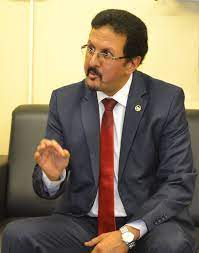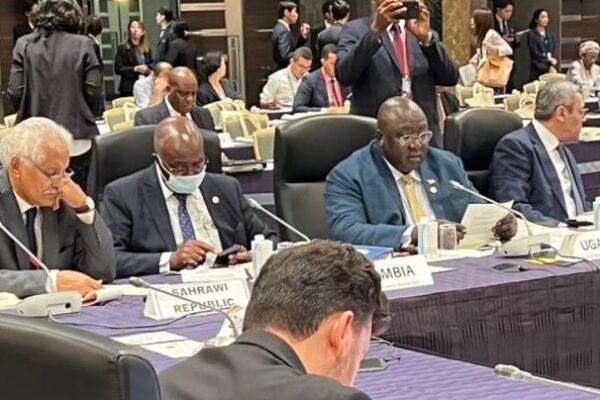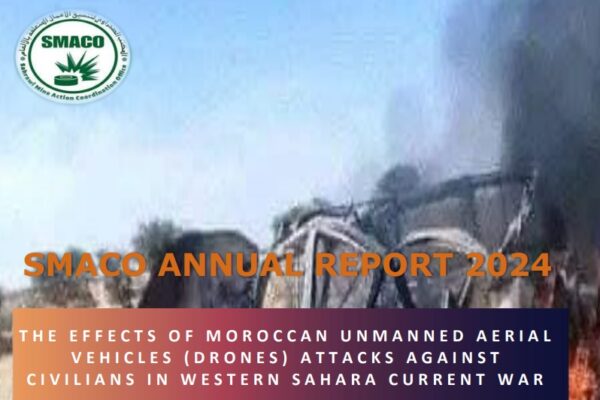Western Sahara still occupied, Africa still not free!

Mr. Malainin Mohamed (Lakhal) is Ambassador of the Saharawi Arab Democratic Republic in Botswana & Permanent Representative to SADC
Africans can never enjoy real peace and security in Africa when a fellow member of the African Union continues to endure long years of suffering, turmoil and oppression at the behest of another Member State.
These are the words of H.E. Dr. Mokgweetsi E.K. Masisi, president of Botswana, in his speech before the 14th Extraordinary Summit of the African Union on Silencing the Guns, held last 6 December 2020.
Dr. Masis continued: “We will continue to call on the international community to redouble the efforts to right the wrong that continue torment the peace-loving Saharawi people.”
In fact, many Africans believe that the decolonisation of Africa is old history.
The majority probably ignores that there are, under our watch as generations, African territories and peoples still under occupation, suffering the same violations and ordeals most African nations suffered for centuries under European colonialism.
Huge parts of the Saharawi Republic, more known by its geographical colonial name “Western Sahara”, is in fact the last territory still fighting for freedom and decolonisation.
Most of the time, Africans, and even Pan-Africanists, have no idea about what’s going on in this North African territory.
The story
Western Sahara – bordered by Morocco, Algeria, Mauritania, and the Atlantic Ocean – first fell under Spanish rule back in 1884, when the European colonisers met during the infamous Berlin Conference to divide Africa in pieces.
The territory was then called, the “Spanish Sahara”, and became the 53rd province of Spain in 1958. The Spaniards, of course, were faced with fierce resistance by the indigenous people of the territory, the Saharawis (Literally meaning “native of the desert”).
Saharawis never received support from any neighbouring country, the majority of which were anyway under colonisation themselves until the sixties.
The United Nations recognised the “Spanish Sahara” (which will be named Western Sahara since the end of the 1960s) as a Non-Self-Governing Territory (a colony according to the UN terminology), whose people have an inalienable right to self-determination under the UN General Assembly’s landmark resolution 1514, adopted in 1960, which contributed back then to the liberation of almost half African nations now independent.
As for the Organisation of African Unity (African Union), it supported the decolonisation of Western Sahara as early as 1963 and continued raising the matter in the UN General Assembly. In the seventies, the OAU extended unconditional support to the legitimate struggle of the Sahrawi liberation movement, the Frente POLISARIO.
Sahrawi freedom-fighters forced Spain in 1974 to start negotiations, and a referendum on self-determination was expected to be organised under the auspices of the UN in 1975 with the full support from Africans.
However, Spain had other plans. It was secretly conspiring with neighbouring countries, Morocco and Mauritania (which were independent by then), for the two African countries to collectively invade the territory from North and South, divide it in two “slices” like a booty or a cake while Spain keeps its privileged interests in the exploitation of the rich natural resources in the region.
The 31st of October 1975 marked the shame of the conspiracy. Moroccan army and air force rained Napalm and White Phosphorus on the surprised Saharawi people, invading the territory, killing thousands of men, women, and children.
The invasion also exterminated millions of livestock (basically camels, sheep, and goats), which is the main source of wealth of the traditional nomads of the desert, poisoning water sources and massively hunting down people and animals.
It was, in fact a well-planned and old colonialist tactic to reduce thousands of Sahrawi families to complete poverty, exterminate or force them to submit to the invader and seize the territory and its wealth.
Caught between two fires, the Sahrawi liberation movement, the Frente POLISARIO, had to face the double invasion from North and South, while trying to save the lives of thousands of refugees who were fleeing the genocide.
In early 1976, POLISARIO succeeded to obtain support from Algeria, the only neighbouring country that did not attack Western Sahara.
Algeria is well-known world-wide for its support to all liberation movements in Africa, Latin America and Asia.
The Sahrawi refugees established their camps in the Southern-West Algeria where they are still living today as the oldest political refugees in Africa.
To face this Spanish betrayal and inappropriate evasion of its responsibility to decolonise the territory, the Saharawi Liberation Movement proclaimed the Saharawi Independent State under the name of the “Sahrawi Arab Democratic Republic” (SADR) as a sovereign expression of the will of the people on the 27th February 1976, exactly one day after the Spanish administration unilaterally withdrew without completing the UN-sanctioned referendum on self-determination for the people of the territory.
The Saharawi State was immediately recognised by most progressive and free African and Latin American nations.
International stands
The UN Security Council and General Assembly have, to date, adopted more than one hundred resolutions reaffirming the Sahrawi people’s rights to freedom and independence.
Yet, 57 years on, Sahrawis are still denied the legitimate and fundamental right to self-determination.
In 1991, the UN brokered an OAU-UN peace plan accepted by the two parties to the conflict, the Frente POLISARIO and Morocco. A cease-fire was put in place and a referendum was supposed to take place in 1992.
Few months after the deployment of the UN Mission, MINURSO, in the territory, Morocco started evading its engagements again, adopting various delaying tactics, refusing all peaceful plans so far proposed by the UN to resolve the conflict and violating all rules and principles of the African Union (AU) and UN.
Yet, Morocco continues benefiting from protection from some European countries.
Throughout the years of occupation, Morocco has systematically plundered Sahrawi natural resources worth billions of dollars, while the Saharawi people languished in refugee camps, or under military occupation, deprived from their most basic civil, political, economic, and cultural rights.
Western Sahara is not a barren desert, as it may sound. It is rich with a reserve of high-quality phosphate, fishing resources, possible reserves of oil and gas, iron, gold and many other minerals.
Given its breath-taking natural beauty and its tolerant, hospitable and generous Muslim African people, it can be one of the most attractive tourist destinations in the world. Its 1200 Km coast on the Atlantic Ocean, where the sea and sand dunes meet to form some of the most beautiful beaches in the world, gives her a great geopolitical importance in the region.
But, all this wealth became a curse attracting unscrupulous multinationals and investments that care more for profit than ethics, legality or human rights of the oppressed people of the territory.
France and Spain are among the major parties responsible for the ordeal of the people of Western Sahara, and they both continue to unfortunately support the occupation, though they persist denying their historical, political, economic and ethical responsibility towards the people of the territory.
The European Union Commission is also implicated in the support of the Moroccan occupation by tolerating Morocco’s plunder of Sahrawi resources.
The EU Commission (having reaffirmed that it does not recognise Moroccan sovereignty over Western Sahara in recent written answers to European Parliamentarians), violates the European Court of Justice (ECJ) rulings of 2016 and 2018, which stipulate that Europeans should not deal in goods originating from the occupied territory of Western Sahara.
Unfortunately, the EU Commission decided to renew trade agreements with Morocco, allowing imports of “stolen goods” to enter the European market.
The UN is also missing all the deadlines it had set to end colonialism.
The global organisation is suffering from the conflicting agendas within its decision-making system.
While the UN General Assembly is clear regarding the necessity of keeping the conflict of Western Sahara within the scope of its decolonisation doctrine, some influencing Permanent Members of the Security Council are trying to put the conflict under “realpolitik” control. This accurately means that we are here in a conflict that criss-crosses between the rule of international law and respect for peoples’ rights and the rule of the jungle (or “might makes right”) that some powers are eager to see dominate in international relations.
A united people is never defeated
But, what is sure is that the people of Western Sahara have given proof that they will never give up their fight. They resisted many invaders in the past, and they are still resisting the last one, the Kingdom of Morocco, which will have to leave the parts of the territory it illegally occupies, sooner or later, like all its predecessors and like all other colonisers and powers of occupation, who were forced to leave their former colonies in the rest of Africa when the people fought for their rights.
The African Union is also to blame for this injustice. It is not enough to recognise the Saharawi Republic as the legitimate state and government in the territory.
African solidarity must prevail in this case as it prevailed in other older cases where the majority of Africans stood by the legitimate struggles of the people against colonialism and Apartheid in South Africa, Namibia, Zimbabwe, Angola, Mozambique and elsewhere.
It is not enough to adopt resolutions and written texts of support to the people of Western Sahara, if we do not openly and firmly perform actions and start initiatives that concretely support them getting free from their oppressors.
Freedom, democracy and human rights are universal and should be granted to all equally.
Yet, the people of Western Sahara seem to be an exception so far, for they are still denied these legitimate and most basic rights, while a lot of Africans, simply turn their heads away thinking that Africa can emerge while some of its people are still oppressed and colonized.
But, we must all know that it is only when Western Sahara is fully free from Moroccan occupation that we could say that Africa is totally free, to paraphrase the late President Kwame Nkrumah’s statement on Africa’s true freedom, development and emancipation.






